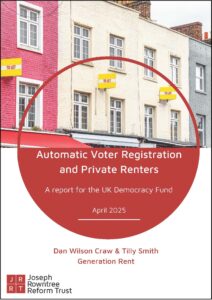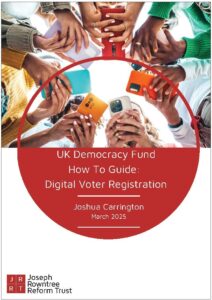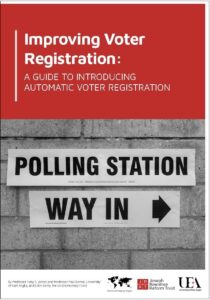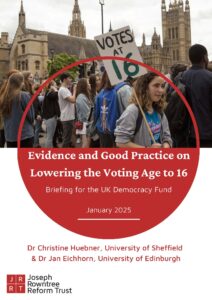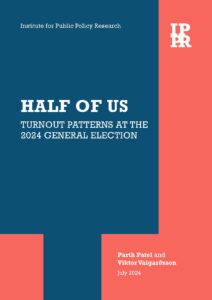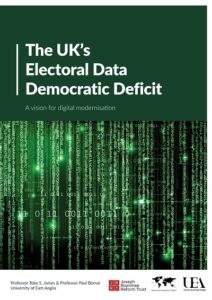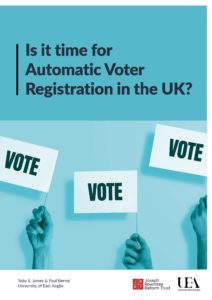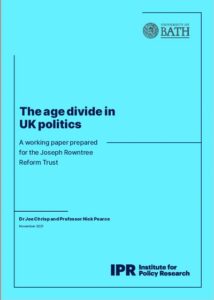The UK Democracy Fund awards grants, funds research and holds events to disseminate learning.
Please see an overview of the Fund’s work below. All grants made by the Fund are listed on our Grants awarded page.
The UK Democracy Fund’s Funding framework
Our funding framework will help you to see if your idea is a good fit with our strategy.
In 2025, our priorities are:
Enabling everyone to vote: Building support for reforms to ensure a simple, seamless and accessible voting system fit for the 21st century.
Extending the right to vote: Advocating in support of expanding the franchise for 16- and 17-year-olds and settled UK residents from overseas.
Download the Funding framework as a PDF here
_____________________________________________
Automatic Voter Registration and Private Renters
Dan Wilson Craw and Tilly Smith, Generation Rent, April 2025
Private renters are one of the least enfranchised groups in British society, with low levels of voter registration arising from frequent moves. Electoral Commission data shows that those who have lived in their home for less than a year are registered at only 39%, compared to 95% for those who have lived in their home 16 years or more.
Generation Rent’s new report, commissioned by the UK Democracy Fund, shows how transformational Automatic Voter Registration (AVR) could be for private renters.
Their research found that 91% of private renters could be registered through an automated system. For those not registered this way, the report highlights the points of engagement these renters do have with institutions which could support an automated registration system, such as banks, GP surgeries and energy providers.
_____________________________________________
How To Guide: Digital Voter Registration
Joshua Carrington, March 2025
This guide to Digital Voter Registration, written for the UK Democracy Fund, is organised into two parts: Planning your campaign: introducing digital voter registration and deciding whether it’s a good fit for your organisation; and Making it work: practical guidance and examples on implementing it.
The guide also includes key considerations about regulations and compliance, and provides recommendations on how to think about resourcing this strand of work.
_____________________________________________
Improving Voter Registration: A Guide to Introducing Automatic Voter Registration
Professor Toby S. James and Professor Paul Bernal, University
of East Anglia, and Ellen Berry, the UK Democracy Fund, February 2025
Voter registration is crucial for ensuring that citizens can smoothly cast their vote on an election day, but millions of people are missing from the electoral rolls – and are therefore unable to vote on the day of an election.
Professors Toby S. James and Paul Bernal from the University of East Anglia, and the UK Democracy Fund, share some guidance on how an automatic, or direct, form of voter registrati0on can be implemented to address this challenge.
_____________________________________________
Evidence and Good Practice on Lowering the Voting Age to 16
Dr Christine Huebner, University of Sheffield & Dr Jan Eichhorn, University of Edinburgh, January 2025
The United Kingdom’s age of enfranchisement is currently inconsistent across its constituent countries. While 16- and 17-year-olds in Scotland and Wales can vote in local and Scottish Parliament or Senedd elections, their peers in England and Northern Ireland cannot vote in any elections. The current government wants to give 16- and 17-year-olds the right to vote in all UK elections.
This briefing paper for the UK Democracy Fund summarises key evidence on the outcomes of lowering the voting age to 16 from countries that have extended the franchise to younger people, and provides an overview of emerging evidence on what is important in the implementation and delivery of voting age reform in the UK.
_____________________________________________
Half of Us: Turnout patterns at the 2024 general election
Dr Parth Patel & Dr Viktor Valgarðsson, IPPR, July 2024
One-half of adults in this country voted at the 2024 general election, the lowest share of the population to vote since universal suffrage. This report takes a first look at who spoke in the 2024 UK general election. By linking election turnout results to demographic data from the 2021 census, it documents patterns of turnout by age distribution, housing tenure, ethnic background and religion at the constituency level.
This analysis paper for the UK Democracy Fund considers the implications this might have on policy and politics in the years ahead and put forward policy recommendations to improve electoral participation.
_____________________________________________
The UK’s Electoral Data Deficit: A vision for digital modernisation
Professor Toby S. James & Professor Paul Bernal, January 2023
This report outlines the electoral data democratic deficit in the UK and its consequences for democracy, and makes the case for urgently establishing a comprehensive architecture and approach to electoral data to enable a fairer and more inclusive democracy.
It describes how there is substantial untapped potential where electoral data could be used to support citizens to be better informed, for electoral institutions to be much more transparent, and for a wide range of actors (including regulators, media, and civil society) to leverage data to promote participation in elections.
It provides a short- and longer-term plan for modernising the electoral data architecture and approach to ensure it is fit for purpose for the 21st century
_____________________________________________
Making Votes at 16 work in Wales
Dr Christine Huebner et al, November 2021

At the May 2021 elections to the Welsh Senedd, tens of thousands of 16 and 17 year olds were able to vote for the first time, joining their peers in Scotland in participating in the democratic process.
The UK Democracy Fund supported a set of grantees to engage newly enfranchised voters in the election. It also funded the ‘Making Votes at 16 work in Wales’ evaluation conducted by a research collaboration led by Christine Huebner at Nottingham Trent University. The researchers evaluated young people’s experiences of the 2021 Senedd elections in Wales to find out what works to mobilise 16- and 17-year olds, especially those from traditionally under-represented groups, to turn out to vote. The resulting evaluation presents lessons and policy recommendations for both the Welsh context and further afield.
Download the full report here and download the policy recommendations here.
And you can find out more about the organisations that the Fund supported to engage newly enfranchised voters here.
_____________________________________________
Is it time for Automatic Voter Registration in the UK?
Toby James and Paul Bernal of the University of East Anglia, April 2020
Millions are missing from the electoral registers – the Electoral Commission estimated in September 2019 that some 17% of eligible voters in Great Britain were not correctly registered. Cross-party support is building with backing from the Political and Constitutional Reform Committee in its 2014 report on voter engagement and the APPG on Democratic Participation report in 2019.
Is automatic voter registration (AVR) the solution? The research report sets out the array of measures, such as automatic voter registration and assisted voter registration that could be adopted. It considers the impacts on privacy, data protection, consent and security.
_____________________________________________
Closing the gap: engaging the missing millions in electoral participation. Insights from the UK Democracy Fund 2019-2021.
Carrie Deacon, November 2021
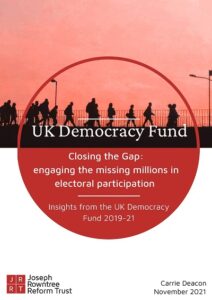 Carrie Deacon, a senior advisor to the Fund, summarises the Fund’s learning to date drawing on grant analysis, funded research and grantee feedback from the Fund’s work at the 2019 and 2021 elections. Grantees supported by the Fund have produced a range of learning on what works, what doesn’t and where significant gaps in knowledge and action remain. The learning shows some areas of real promise that can be built upon, such as digital campaigns particularly aimed at young people, institutional partnerships to embed voter registration such as at universities, colleges and schools. It also highlights areas in which the Fund and its grantees need to develop more evidence to understand what works.
Carrie Deacon, a senior advisor to the Fund, summarises the Fund’s learning to date drawing on grant analysis, funded research and grantee feedback from the Fund’s work at the 2019 and 2021 elections. Grantees supported by the Fund have produced a range of learning on what works, what doesn’t and where significant gaps in knowledge and action remain. The learning shows some areas of real promise that can be built upon, such as digital campaigns particularly aimed at young people, institutional partnerships to embed voter registration such as at universities, colleges and schools. It also highlights areas in which the Fund and its grantees need to develop more evidence to understand what works.
_____________________________________________
London Voices: the journey to full participation.
The Young Europeans Network, December 2021
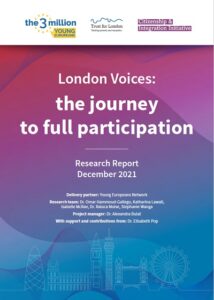 Everyone has a unique journey to civic and democratic participation. Whether we speak about volunteering, voting, voicing a view in a consultation or contacting a local representative, our lived experiences make up our journeys. London Voices maps out Londoners’ journeys to civic and democratic participation, with a focus on under-represented and marginalised Londoners. This comprehensive research into the mechanisms that can facilitate equal, inclusive, representative civic and democratic participation was commissioned by Trust for London, on behalf of the Citizenship and Integration Initiative, and the UK Democracy Fund. It was supported by the Greater London Authority (GLA), and has been delivered by the3million Young Europeans Network.
Everyone has a unique journey to civic and democratic participation. Whether we speak about volunteering, voting, voicing a view in a consultation or contacting a local representative, our lived experiences make up our journeys. London Voices maps out Londoners’ journeys to civic and democratic participation, with a focus on under-represented and marginalised Londoners. This comprehensive research into the mechanisms that can facilitate equal, inclusive, representative civic and democratic participation was commissioned by Trust for London, on behalf of the Citizenship and Integration Initiative, and the UK Democracy Fund. It was supported by the Greater London Authority (GLA), and has been delivered by the3million Young Europeans Network.
_____________________________________________
The Age Divide in UK Politics: A working paper prepared for the UK Democracy Fund
Dr Joe Chrisp and Professor Nick Pearce, November 2021
The impact of age on voting behaviour and political outcomes has become an issue of increasing political and public interest, particularly in the UK. Registration to vote and turnout rates are much lower for the young than the old, and partisan preferences now differ sharply by age. The 2017 and 2019 UK general elections saw unprecedented demographic divisions in the electorate between older and younger voters,This paper provides an analysis of the age divide in UK Politics, exploring the trends over recent general elections. It looks at the data, interacting turnout by age with other key variables, such as gender, education, ethnicity and housing tenure, before examining how support for the main political parties varies by age. The paper goes on to respond to a tendency to explain away age differences as either simply about education or homeownership by interacting age, education and housing tenure to create 8 sub-groups of voters. We examine their voting patterns and their policy preferences to assess the relative independent weight of each factor in determining the main divides of our politics and the possible direction of travel in future elections. The paper also discusses how the age divide in UK politics is theorised in the political science literature and where it could and should go next.
_____________________________________________
The democratic participation of ethnic minority and immigrant voters in the UK.
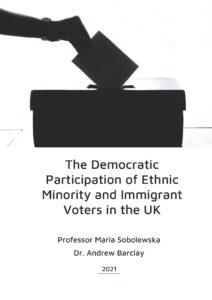 Professor Maria Sobolewska and Dr Andrew Barclay, November 2021
Professor Maria Sobolewska and Dr Andrew Barclay, November 2021
There is evidence that different ethnic groups register and participate in elections at different rates, but data and understanding of this area is limited. This research reviews existing published and unpublished evidence on democratic participation of different ethnic minority and immigrant voter groups in the UK. It highlights the dearth of available data on this subject. What is known shows that for many communities the participation gap is primarily a registration gap – once registered, the turnout gap is much smaller. The research identifies key barriers to registration for different ethnic minority communities. It also confirms the high levels of intersectionality between different socially marginalised groups. In terms of possible solutions, it highlights citizenship, automated and assisted voter registration as well as engagement via informal networks, as promising avenues to reaching under-represented communities.
_____________________________________________
The UK Democracy Fund’s Voter registration and getting out the vote guide
Through our research, and evaluation of learning from work we have funded we’ve developed a good understanding of what makes voter registration and get-out-the-vote campaigns successful. Find out more about how to run a successful campaign in this guide.

